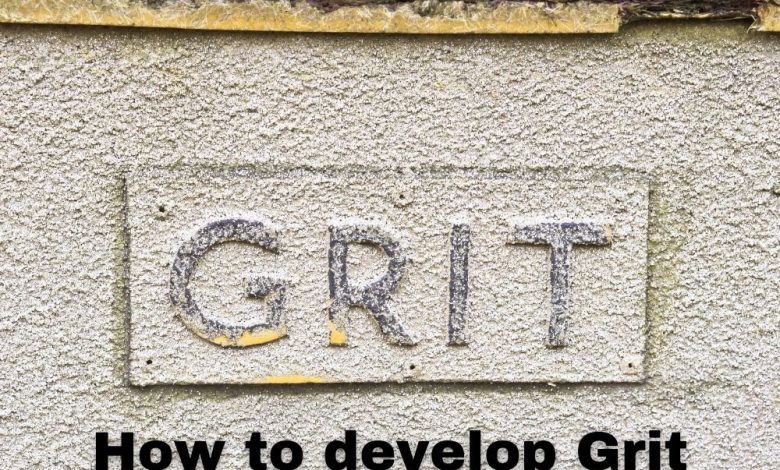How to Develop Grit

What is grit?
Let’s start by defining grit. Grit is defined as the determination and enthusiasm to attain long–term objectives. Mental toughness is a term that is sometimes used to describe grit. According to Angela Duckworth, a University of Pennsylvania researcher, grit is a powerful predictor of success and capacity to achieve one’s goals.
According to Duckworth’s grit studies,
- Cadets who scored the highest on the Grit Test had a 60% higher chance of succeeding than their classmates.
- Even though they had lower SAT scores and were not as “clever,” Ivy League undergraduate students with more grit had higher GPAs than their counterparts.
- When two people of the same age but different levels of education are compared, grit (rather than IQ) indicates who will be better educated.
- The National Spelling Bee competitors outperform their colleagues not because of their intelligence, but because of their tenacity and commitment to more frequent practice.
What Is the Importance of Grit?
Nothing worthwhile in life is easy. Success is never a fluke.
According to research, the ability to be tenacious — to continue with things that matter to you and bounce back from setbacks — is a key component of success.
You can have all the brilliance in the world, but without effort, you will never reach your objectives. This is why grit is so important. NEET Previous Year Question Papers
What difference does it make?
According to studies, the majority of people believe that talent is the most important factor in achieving success. Is this to say that we “ordinary people” don’t need to strive for greatness? “For if we think of brilliance as something miraculous, we are not bound to compare ourselves and find ourselves wanting…” said Nietzsche. When it comes to how well we do in life’s marathon, effort takes precedence over everything else.
What can you do to improve your grit?
Define your goals.
The toughest people have a crystal-clear idea of what they want to achieve in the end, and most of their lesser goals are aligned with that aim. To unite your goals, Duckworth recommends Warren Buffet’s three-step process:
- Make a list of 25 career objectives. (You may have that many!)
- Make a circle around the five most important objectives. (This step necessitates soul-searching.)
- Take a look at the final 20 goals. Which ones help you achieve your top five objectives? All other objectives: They must be avoided at all costs. They take your attention away from you.
Find out what fascinates you.
Passion comes from a source of interest. People are more content with their professions when they can perform something that they enjoy. However, discovering your passions can take some time. (The oncologist who said in third grade that she wanted to cure cancer is an exception!) Allow time for self-discovery: What are some of your favorite topics to ponder? What is it that you truly care about? What is most important to you?
Practice regularly.
Gritty people simply spend more time on jobs. MORE TIME TO WORK ON PROJECTS. They also practice consciously, which means they do so in a way that:
- A stretch objective that is established
- Complete focus and effort
- The feedback that is both immediate and informative
- Repetition combined with thought and refinement
Know what you want to achieve.
When you’re passionate about something, you get a spark inside of you. That is the start of a mission. Ask yourself how your passion ties to other people, how it connects to the greater picture, and how it expresses your core values, whatever it is. What contribution will it make to the well-being of others? People with grit keep going because they know what they’re doing.
Make positive self-talk a habit.
“Whether you think you can, or you think you can’t – you’re right,” Henry Ford wrote. Your mindset influences a lot of what you do. It’s critical to cultivate a growth mentality so you can keep going when things get tough.
Pay attention to your self-talk as well: People speak to themselves at a rate of 300 to 1000 words per minute. Olympic athletes agree that those statements must be encouraging.
Grit in Action
- Mentally tough athletes are more consistent than others. They never skip a workout. They never fail to complete homework. They are always there for their teammates.
- Mentally tough leaders are more consistent than their colleagues. They have a certain aim in mind that they strive to achieve every day. They don’t let short–term profits, unfavorable criticism, or busy schedules stop them from pursuing their goals. They have a habit of boosting the morale of those around them – not just once, but repeatedly.
Mentally tough artists, writers, and employees are more reliable than the majority. They work on a set timetable rather than whenever they feel inspired. They approach their task with the professionalism of a professional, not a novice. They prioritize the most critical tasks and do not avoid taking on additional duties.
What Are Grit’s Characteristics?
The good news is that grit is something that can be learned and cultivated through time. You must, however, first adopt a growth mindset. Unfortunately, many people are stuck in their ways.
They’ve been programmed to believe that their IQ would never improve. A growth mentality celebrates the path from “I can’t” to “I can.” A fixed mindset is centered on “I can” or “I can’t.”
Do you feel that your intelligence is fixed or that it may grow and change?
The qualities of grit are listed below. Consider the ones with which you connect the most and which you still need to improve.
Passion
There is always a purpose when there is passion. Passionate people are well-versed in their skin. They are aware of their values, ideas, and requirements.
More importantly, they live by following their values and encourage others to do so as well. Paying attention to and following what makes you come alive on the inside is what living with passion entails.
It’s okay if not everyone understands your route in life. True grit is the ability to tune out other people’s opinions and stay in your path.
Perseverance
I’ve never met a powerful individual with a carefree past. Despite all obstacles, persevering is learning to sit with your darkness and soften into the ache.
The only difference between those who succeed and those who fail in their desire to keep trying and failing. It’s understanding that your drive to attain your goals is stronger than any challenge.
Learn to embrace discomfort and turn it into a tool for growth and development. Every step of the way, celebrate yourself and don’t stop until you’re ecstatic about who you’ve become.
Resilience
Gritty people are resilient, meaning they thrive in the face of hardship. They reframe every difficulty as an opportunity and put forth the effort to conquer their emotions.
According to research, resilience is a measure of how tough you are. Instead, it’s all about your willingness to keep trying when everyone else has given up. [3]
Resilient people are aware of when it is appropriate to submit to life’s rollercoaster ride. Their ability to soften into what it allows them to make place for what is to come.
The Four-Step Formula for Increasing Grit
What are the characteristics of gritty people? Duckworth states that the recipe for generating greater grit is made up of four elements:
Exercising
Deliberate practice entails learning as you go and receiving feedback from both yourself and others.
The SpaceX team did not attempt to land on a barge in the water right away; instead, they practiced on land first with lesser rockets. They attempted the sea landing once they had accomplished that.
When they failed, they simply chalked it up to being another practice attempt.
The goal
The purpose is something in which you can acquire a long-term interest. If you’re practicing something you don’t feel passionate about or aren’t very interested in, it’s pointless.
Of course, the term “purpose” is frequently used. What matters is that you choose something you can easily dig deeper into the more you learn, rather than some inherent calling.
That required not only creating a rocket that could launch and land upright but also looking into secondary and tertiary aspects of the project, like a drone barge, for SpaceX.
Wishes
Failure is unavoidable, but if we learn to view it as an opportunity to learn, grow, and then rise again, we’ll be more likely to succeed in future endeavors.
To acquire greater grit, you must first learn to hope, and then learn that failing is okay as long as you don’t give up or quit.
Time
The grit formula’s final component is just time. It’s time to focus on practice, goal-setting, and learning from mistakes.
It’s crucial to have something you’re passionate about, something you can practice and get feedback on, and something you aspire to succeed at. Giving yourself time to practice, learn, and stay in the game is, of course, the key.
A Take-Home Message
The qualities of grit, resilience and a development mindset are all linked. Some people feel these characteristics are intrinsic, while others, such as Dweck and Duckworth, believe they can be learned. It takes time, patience, and focus to develop them.
Many resources, such as books, programs, positive psychology podcasts, and movies, are available to help people better grasp these characteristics. For individuals interested in determining their level of grit, Duckworth’s Grit Scale is a wonderful place to start.
Grit, resilience, and growth mindsets all vary over time and are influenced by our thoughts, beliefs, and experiences, according to the research.
Successful people don’t get diverted from their long-term goals, and they keep showing up, even when it’s challenging.
If you don’t have those skills, there are five things you can do to improve your grit:
- Pursue your passions. Look for anything that interests you.
- It’s all about practice, practice, practice. Every day, improve a little more.
- Make a connection to something bigger than yourself. Consider how you can be of assistance to others.
- Cultivate a sense of optimism. Remove your restricting, erroneous beliefs.
- Surround yourself with tough individuals. Create a favorable peer pressure environment. NEET




